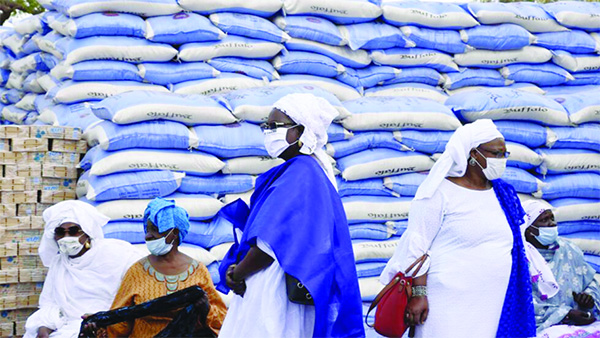Management of Force Covid funds : More than 10 persons detained

Yesterday, more than a dozen people, including former DAGEs from the Ministries of Sports, Youth, and Artists, were taken into police custody as part of the Court of Auditors’ report on the Covid-19 fund. They are expected to be referred to the PJF in the coming hours.
The fever is rising in the handling of the Covid 19 fund file revealed by the Court of Auditors. The Criminal Investigation Division (DIC) has interviewed several personalities in recent hours and placed in police custody more than ten people including artists and stylists, such as Baba Amdy, Sadiya Guèye, Abdou Aziz. There are also the named Souleymane Ba, Ndary Touré, Bassirou Fall, Ms. Fatou Faty, Djibril Kane, Samba Fall, Mamadou Mountaga Ba and the former Directors of General Administration and Equipment (DAGE) of the Ministries of Youth and Sports, namely Mouhamadou Séne and Mamadou Ngom Niang.
Questions to the government at the Parlaiament: Sonko’s Show
All these people will be referred to the PJF for alleged misappropriation of public funds in the handling of this affair, which was revealed by the Court of Auditors. The amounts charged vary from one person to another, even though the case has been dragging on for several months.
[themoneytizer id= »124208-2″]
This would be a relaunch of this case, which is one of the most explosive legacies of the Sall regime. While the processing of the case began after a referral was given to the Criminal Investigation Division (DIC), followed by a parade of certain personalities pinned by the report on the Covid-19 fund, it was almost at a standstill. However, the DIC, which had not fully completed its investigations, decided to accelerate the procedure on the instructions of the PJF, which was also undoubtedly put under pressure by the authorities who publicly displayed their annoyance at the slowness noted in their processing.
Some civil servants already appeared before the Financial Disciplinary Chamber of the Court of Auditors for acts deemed mismanagement
The conclusions of the Court of Auditors’ report on the Covid-19 fund shocked the country due to certain revelations about the management of this financial windfall. At the time, the government supported the controversy and sought to bring the debate back into perspective. It emphasized that the Court had, in its document, « 85 highly relevant recommendations, which will be capitalized on and internalized as best practices in public resource governance in emergency and crisis situations. » In addition to these recommendations, some concern management errors that have been identified and require that the perpetrators be prosecuted. And on this point, the government is leaving the initiative to the Court of Auditors.
Lawyer Doudou Ndoye on Amnesty Law: «The Interpretative Law does not exist»
During an explanation session, they argued that of the 1 trillion CFA francs in the Covid-19 fund, only 6 billion 686 million 784 thousand 410 CFA francs were subject to reservations by the magistrates of the Court of Auditors. So, in relative terms, 0.4% of the total amount. And this misuse would have been the responsibility of senior officials from nine ministerial departments, according to the Court’s document. These include, among others, the directors-heads of services and the DAGEs in office at the time in the ministries of Health, Microfinance and Solidarity Economy, Mines and Geology, Community Development and Social Equity, Youth, Trade, Women and Family, as well as those of Culture and Communication.
Guy Marius Sagna on travel bans: “Any measure restricting a fundamental freedom must be notified…”
The acts they are accused of are of various natures and range, among others, from « failure to justify expenses » or « absence of supporting documents » relating to expenses to « payments without service provided », including « overcharging » for the acquisition of certain products. Not to mention certain cash payments for purchases, which is contrary to the rule in the Public Administration. It should be noted that of the 1000 billion of the Covid-19 fund in question, 628 billion CFA francs were drawn from the Public Treasury, while 372 billion were tax waiver measures aimed at enabling domestic private companies to withstand the shock of losing their economic activities and avoid closing down during the Covid-19 period.
[themoneytizer id= »124208-19″]
The Covid-19 fund was intended to enable the implementation of the Economic and Social Resilience Program (PRES) in its four areas: supporting the health sector, strengthening the resilience of the population and social cohesion, safeguarding macroeconomic and financial stability, and securing the supply and distribution of food, medicines, and energy.
By Bocar SAKHO / bsakho@lequotidien.sn

